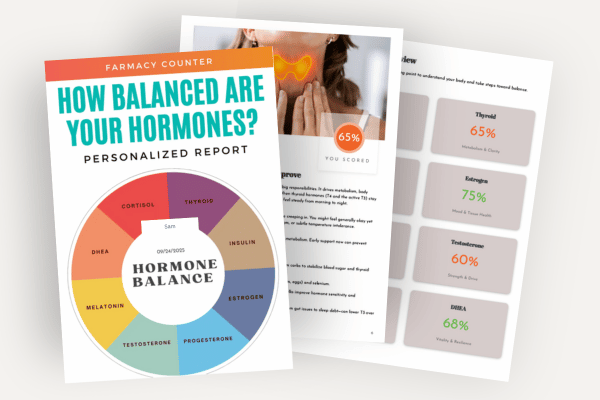
You know that feeling when something just doesn’t sit right in your body? You’re tired even after a full night’s sleep. You’re more irritable than usual, or your focus keeps slipping. Maybe your skin is breaking out around your jawline, or your weight seems to shift for no clear reason.
It’s easy to chalk it up to stress, aging, or just “life being hectic.” But sometimes it runs deeper than that. Hormones are your body’s internal messengers — and when they’re out of balance, they can show up in subtle, often interconnected ways.
In functional medicine, we see these symptoms as signals rather than problems to suppress. They’re your body’s way of saying that something in your communication network — your hormones, metabolism, gut, or stress response — needs a little recalibration.
Common Signs of Hormonal Imbalance
You don’t have to have all of these to know something’s off. Even a few can suggest your system is working harder than it should:
- Waking up tired, even after a full night’s sleep
- Mood swings or irritability that seem to come out of nowhere
- Brain fog or trouble focusing
- Weight gain (or loss) that doesn’t match your habits
- Intense sugar or carb cravings
- Difficulty falling or staying asleep
- Feeling “wired but tired” — overstimulated and exhausted at the same time
- Acne or breakouts along the chin or jawline
- Low libido or feeling emotionally flat
These aren’t random. They often point to deeper imbalances in one or more systems that affect hormonal health — like your blood sugar regulation, gut microbiome, liver detoxification, and HPA (stress) axis.

Functional Medicine Lens: Why Hormones Drift Out of Balance
- Blood Sugar Swings: Frequent spikes and crashes in glucose trigger cortisol, which can suppress progesterone and thyroid function.
- Chronic Stress: Ongoing stress keeps your body in “fight or flight,” diverting resources away from sex hormone production and disrupting ovulation, libido, and sleep.
- Gut Dysbiosis: Your gut helps metabolize and clear hormones. When it’s imbalanced, estrogen and other hormones can recirculate, leading to symptoms like PMS, bloating, or mood changes.
- Liver Load: The liver detoxifies used hormones. If it’s overburdened (from alcohol, toxins, or nutrient deficiencies), hormone clearance slows down, creating excess estrogen or sluggish metabolism.
- Micronutrient Deficiencies: Zinc, magnesium, B vitamins, and essential fatty acids are all required for hormone synthesis and balance — and are often depleted by stress and processed foods.

The Good News: Hormones Are Responsive
Your hormones want to find equilibrium. With the right inputs, they can often rebalance naturally. Small, consistent changes make a big impact:
- Balance your meals: Include protein, fiber, and healthy fats every 3–4 hours to steady blood sugar and reduce cortisol spikes.
- Support detox pathways: Eat colorful vegetables (especially crucifers) and stay hydrated to help your liver clear excess hormones.
- Nourish your gut: Include fermented and prebiotic foods to support microbiome diversity.
- Prioritize rest: Quality sleep, gentle movement, and stress-reduction techniques like deep breathing or yoga help regulate your HPA axis.

The Takeaway
Hormonal imbalance isn’t a diagnosis — it’s a message. Your body is asking for support, not stricter rules. By tuning in, stabilizing your foundation, and giving your system the nutrients and rest it needs, you create the conditions for hormones to rebalance naturally.
You don’t need perfection. You just need awareness — and consistency in caring for the systems that care for you.
Ready to See Where Your Hormones Stand?
If you’re wondering how your own hormone rhythms are functioning — and whether stress, sleep loss, or lifestyle shifts might be throwing things off — here’s an easy next step.
👉 Take the “How Balanced Are Your Hormones?” Quiz here»
You’ll receive a free, personalized 13-page hormone report that explores eight key hormone systems through a functional medicine lens, including:
✅ A snapshot of your current hormone balance
✅ Insights into your energy, mood, sleep, metabolism, and reproductive health
✅ Functional medicine–based guidance to help you begin rebalancing naturally
Think of it as your roadmap back to alignment — helping you understand your body’s signals, restore hormonal harmony, and feel more clear, steady, and strong from the inside out.

How Balanced are Your Hormones?
Take our 3-minute quiz to discover your unique hormone balance—and get a personalized 13-page report with insights and actionable steps to support energy, mood, sleep, metabolism, and reproductive health.






